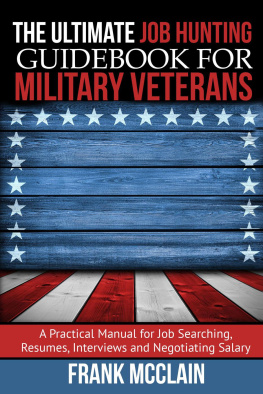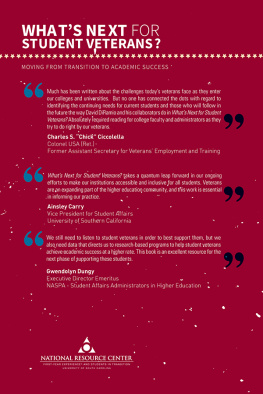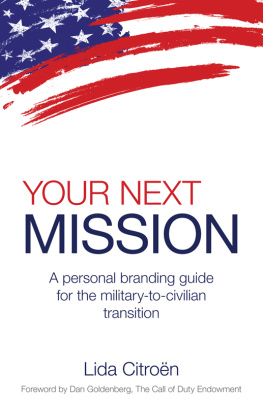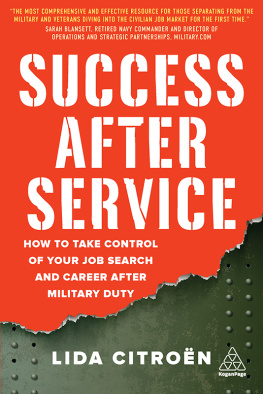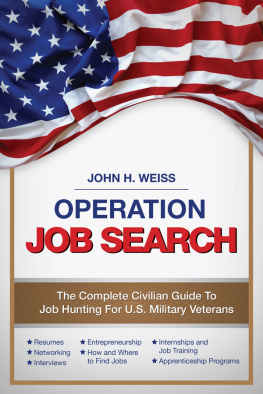Bulk discounts available. For details visit:
www.amacombooks.org/go/specialsales
Or contact special sales:
Phone: 800-250-5308
Email: specialsls@amanet.org
View all the AMACOM titles at: www.amacombooks.org
This publication is designed to provide accurate and authoritative information in regard to the subject matter covered. It is sold with the understanding that the publisher is not engaged in rendering legal, accounting, or other professional service. If legal advice or other expert assistance is required, the services of a competent professional person should be sought.
ISBN : 978-0-8144-1780-5 (eBook)
Library of Congress Cataloging-in-Publication Data
King, Emily, 1965
Field tested: recruiting, managing, and retaining veterans / by Emily King.
p. cm.
Includes bibliographical references and index.
ISBN 978-0-8144-1779-9 (alk. paper)
1. VeteransEmploymentUnited States. 2. Retired military personnelEmploymentUnited States. 3. Personnel managementUnited States. I. Title.
UB357.K525 2011
658.30086970973dc23
2011018173
2012 Emily King
All rights reserved.
This publication may not be reproduced, stored in a retrieval system, or transmitted in whole or in part, in any form or by any means, electronic, mechanical, photocopying, recording, or otherwise, without the prior written permission of AMACOM, a division of American Management Association, 1601 Broadway, New York, NY 10019
About AMA
American Management Association (www.amanet.org) is a world leader in talent development, advancing the skills of individuals to drive business success. Our mission is to support the goals of individuals and organizations through a complete range of products and services, including classroom and virtual seminars, webcasts, webinars, podcasts, conferences, corporate and government solutions, business books, and research. AMAs approach to improving performance combines experiential learninglearning through doingwith opportunities for ongoing professional growth at every step of ones career journey.
Printing number
10 9 8 7 6 5 4 3 2 1
Information about External Hyperlinks in this ebook
Please note that footnotes in this ebook may contain hyperlinks to external websites as part of bibliographic citations. These hyperlinks have not been activated by the publisher, who cannot verify the accuracy of these links beyond the date of publication.
Dedicated to the men and women of
the United States Armed Forces
and the civilian organizations
that hire them.
Contents
THE CHALLENGE OF MILITARY TRANSITION and the importance of the topic to service members and to private sector organizations has been a professional focus since the late 90s, when I first began to explore it. Helping others to overcome the challenge and pay attention to the topic has become a mission that feels very personal. Several people have witnessed my journey over the years and supported me with enthusiasm, sure that a day would come when a larger audience would be just as aware of it and concerned with finding solutions. Chief among these supporters have always been my parents, Marty and Judy, who have always cheered me on in spite of roadblocks and frustrations. Similarly, my brothers Peter and David and sisters Mary and Philippa, along with their amazing children, have always been ready to listen, brainstorm, and troubleshoot. Donna, my cousin, best friend, co-writer of the audio course, and contributor to this book, played an integral role in the development of my thinking in recent years. I simply cannot imagine how this book could have been conceived or written without my incredible family, and thank you seems a woefully inadequate acknowledgment, but Ill say it anyway. Thank you.
Since the earliest days of my investigation, I have had the support of a few individuals who saw the potential and stuck with me through various versions of my vision for it: Matt Minahan, the professor and friend who oversaw my thesis on leadership styles of military versus business cultures; Sandy Mobley, friend, coach, and client who played a key role in my thesis and continued to cheer me on long afterwards; Rob Fleischman, my friend and business mentor, who maintained his faith in me and this work even when mine flagged; and Sherry DiStefano, the friend and colleague who helped me design the very first training program for transitioning veterans and who has helped to shape my thinking on the subject over the years; and Nancy Williams, who donated untold hours, ideas, and words of encouragement during the making of the audio course. Thank you.
My heartfelt thanks go to the many men and women who generously shared their firsthand experiences, giving me a window into the personal nature of military transition. Six individuals in particular have been with me since Day One of the audio program, allowing me to interview them and use their comments in various formats over the years, and who have been an informal group of advisors whose wisdom I have called upon for ongoing calibration of my ideas and understanding: Frank Ball, Jane Maliszewski, Bill Dean, Seb DeLiso, Derek Harris, and Karen Jeffries. Specific to this book, many former service members participated in interviews, surveys, and focus groups, fully throwing themselves into the effort to help their fellow service members going through the process of military transition: Donna Boltz, Matthew Donnelly, Randy Egolf, Luke Faber, Richard Goble, Richie Harris, Steve Harwig, Michael Hellyer, Kyle Johnson, Robin Johnson, Mike Lang, George LeFavor, Jeffrey Matthews, Robert George McCluskie, Michael McLaurin, Jimetris Parnell, John Pilat, Steve Raynes, Cindy Saladin-Muhammad, Art Schlussel, Frank Shawker, George Sneeringer, and Samuel Harold Stevenson. Many, many more have offered insight through the LinkedIn group Military Transition Interest Group, and I thank them as well.
Many civilian organizations supported this effort by making their employees available to provide insight, providing their perspective as employers, and otherwise helping me to do my work: Lynn Alba and Craig Henzel of Merck, Amy Mahoney and Claire Stock of L-3 STRATIS, Texanna Reeves and Betsy Silva of Sodexo, Amy Polefrone of HR Strategy Group, Eric Peterson of SHRM, Mike Elliott of Northrup Grumman, Sean Collins of G.I. Jobs and Victory Media, Glen Williams of Walgreen Co., Christina Parisi and Andy Ambraziejus of AMACOM, and my neighborhood Starbucks where much of this book was written. Members of the media who covered my work include Karin Caifa of CNN , Morris Jones and Sara Kenigsberg of TBD.com, and Mark Stelzner of Inflexion Advisors and Job Angels. Id like to thank a few other individuals as well: Les Garrison, Jan and Peter Bayer, Stuart Younkin, Chuck Anderson, Randy Epstein, Jacki Seley, Rand Gardner, Lauren and Scott Buttrick, and Colonel David Sutherland and Captain DJ Skelton for their insight into wounded warriors.
Finally, my heartfelt thanks to the many women and men who will go unnamed, whom I have had the privilege of coaching through their transition and who honored me with their stories, experiences, and struggles.
EMILY KING IS A PIONEER in organizational development and a thought leader in recruiting for retention, which means recruiting



